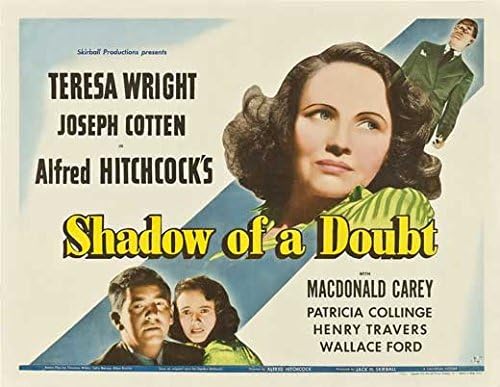

Tiomkin’s theme is pastoral and refined, another matching series of dissolves establish niece Charlie lying in the same relaxed repose as her uncle, but without the jagged angles and dramatic dread – this is really fantastic stuff and well thought out from the get-go. ‘A kiss to Charlie from her Uncle Charlie’ is the telegram he sends to his niece, played by Teresa Wright (who interestingly gets top billing in the movie), and his repeated ‘Santa Rosa’ dialogue transports us to this far more civilised zipcode. Dimitri Tiomkin’s score is stabby, dramatic and great – over the top with Charlie and hitting the footsteps of the two flatfeet who tail him, reaching a climax as he gives them the slip and coolly puffs a cigar. The house is number 13, as you may expect, and he is already under scrutiny from the cops. On the surface he’s a laid back character but has moments of great anger, smashing a glass in his room as his landlady leaves.

This kind of opening, the camera creeping closer and closer to the subject, is just the kind of thing Hitchcock uses at the opening of ‘Psycho’, and works a treat there also.

Establishing shots show Uncle Charlie lying on a bed in a low rent neighbourhood, the camera angled on his boarding house and his window to suggest something slightly off balance. The movie opens fantastically and keeps the pace up admirably throughout. Uncle Charlie is on the run as a suspect in a series of ‘merry widow’ murders and he seeks refuge in his sister and her family’s small town – but the cops turn up here too… This is a really dark movie, and at the heart of it is the menacingly charming figure of Joseph Cotton as Uncle Charlie – a creepy, sinister character with a mysterious past of murder and darkness.


 0 kommentar(er)
0 kommentar(er)
